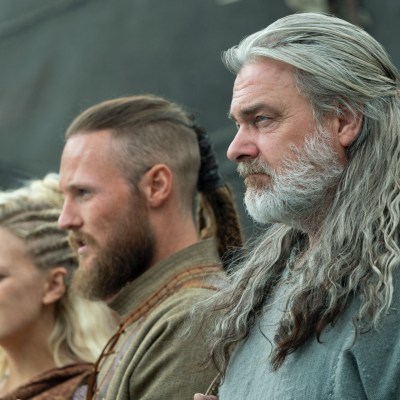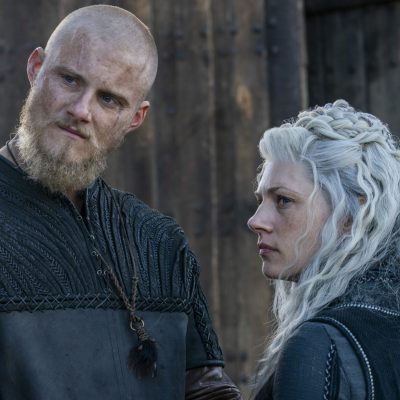This Vikings review contains spoilers.
Vikings Season 6 Episode 16
“The gods work in mysterious ways.”
Amidst a plethora of intense soul searching, Vikings finds itself weighted down in a morass of despair, self-loathing, and regret. And while introspection and personal assessment are necessary growth elements for both characters and storylines, “The Final Straw” plods along before finally revealing the next move for Ivar the Boneless.
With Kjetill and the other Greenlanders in the rear view mirror, Vikings leaves that thread behind, at least for the time being, and hopefully brings some closure to Floki’s Icelandic debacle. Of all the Lothbrok sons, Ubbe has always come across as the most level headed and ethically sound, so it’s extremely painful to watch what’s left of his group flounder at sea while he struggles not only with his faith in the gods but the responsibility he feels for the decision to leave Greenland so abruptly. While we naturally wonder where this group will end up, it’s the friction between Ubbe and the mysterious Christian Othere that drives this arc. As the boat drifts at night, Othere begins singing a hymn which prompts Ubbe to counter with a traditional Viking song as if to state that Odin is more powerful than the Christian God.
Despite losing a child on this ill-fated journey, Torvi still manages to support Ubbe, but it’s her ability to understand the ultimate question they all face once they reach land. “What is the point of finding a new land if we behave just as we did in the old one?” There’s no reason to think that Ubbe can regain his composure, keep the survivors together, and once they find a new home, set out to build a functioning community. Unfortunately, as Torvi points out, more will surely die before they reach their promised land.
While Ubbe battles his own demons, Ivar and Hvitserk must now find a new path now that they’ve returned to Kattegat and a populus that sees both as traitors. Watching the crowd spit upon them as they walk along the dock brings mixed feelings since it’s not easy to forget the old Ivar, but as Hvitserk points out when they ride out of Kiev, Ivar has changed. How much and to what extent remains the focus of his character. We’re treated to a fascinating meeting in Harald’s great hall as Ivar attempts to work his way into the king’s graces, while Erik steams in the background because he knows the Lothbrok brothers pose a threat to his standing with King Harald. Interestingly, it’s Hvitserk that takes the first real step toward recovering their place in Kattegat by pointing out that the people still revere Ragnar and as his sons, they’ll always provide value. It’s also a nice touch to have him admit the struggles he’s faced living in the shadow of his father and brothers. We’ve seen him stumble before, but there’s a sense that he’s back on track to stand with Ivar.
Read more
The primary question, though, is whether Harald allows the brothers back into the fold even though they pronounce their support for him. Harald’s not stupid, but Gunnhild’s death hits him hard, and when he speaks eloquently before a hushed crowd, it seems clear that, like the gods, he’s willing to forgive. “I killed my own brother, and I regret it everyday,” he admits during a speech that retains elements of Marc Antony’s “Friends, Romans, countrymen” speech. We don’t know whether he’s trying to turn the crowd against or in favor of the brothers, but Ivar wisely takes matters into his own hands to win over the citizens. He throws aside his crutch and faceplants onto the wooden floor eliciting great laughter and the first inkling that the brothers Lothbrok are back.
Though she admits her marriage to Harald is purely one of convenience owing to a lack of true options, Ingrid shows she’s more perceptive than the men. She points out to Harald, Ivar, and Hvitserk that if they don’t find purpose in their lives, they’re doomed to “fall out and quarrel.” It’s a recurring theme in the episode, and Ivar even tells his brother that “I don’t know what to do,” a dilemma that sets up a nice series of flashbacks with his father and a younger Igor. It’s compelling to watch Ivar struggle, and while the realization that his destiny does not lie in Kattegat feels genuine, the “lost at sea” allusion falls flat coming on the heels of Ubbe’s situation.
Michael Hirst has employed supernatural elements sparingly along the way, but repeated appearances by The Seer feel overused. However, when the goddess Idun (Jerry-Jane Pears) provides momentary comfort for Hvitserk, the scene works because it comes on the heels of his emotional outpouring in Bjorn’s tomb. He feels lost, and the goddess blessed with eternal youth mesmerizes him, but it’s the result of their coupling that provides an insight into Hvitserk’s soul. Willing to confront his demons, he walks into the street, gets down on his knees, and weeps.
Soul searching, however, only goes so far, and at some point, the men must take action. Ivar steps forward to suggest an option that will reunite viewers with the kingdom of Wessex and King Alfred. A pre-emptive strike at the heart of England gives the Norsemen a renewed sense of purpose, and with Ivar and Hviserk at his feet, Harald gives the stage to Ivar who powerfully speaks of faded heroes and the chance to once again be Vikings. It’s clear that Erik finds Ivar an impediment, but the fact that we know neither Ivar’s nor Harald’s true motivations here, the mission to Wessex looks to be fraught with intrigue.
Though light on much meaningful development, “The Final Straw” does provide a bridge to what may well be the last stand for the sons of Ragnar Lothbrok and the men and women of Kattegat. It’s been a good run, and there’s no reason to think Ivar doesn’t have one more power play in his arsenal. For now, it’s on to Wessex.

